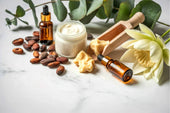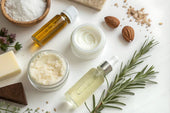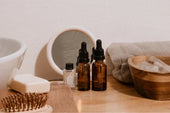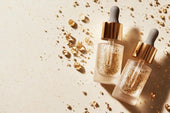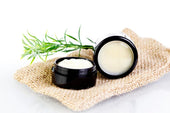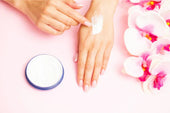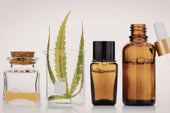The Skin Microbiome: Your Invisible Skin Barrier
 By: Aria Sinclair
, Skincare Specialist
By: Aria Sinclair
, Skincare Specialist

Share
We talk a lot about skincare - from cleansers to serums, and the latest “miracle” ingredients - but we rarely talk about what all these products are really working with: our skin’s microbiome. Think of it as a living layer of protection - a delicate breathing ecosystem of microorganisms that quietly keeps your skin calm, balanced, and resilient.
The microbiome is made up of billions of good bacteria, fungi, and other microbes that forms your skin’s first line of defence. While that might sound alarming, they’re actually your skin’s best allies. Together, they form a kind of invisible shield — defending against pollution, irritants, and harmful bacteria, while also helping to regulate moisture and support the skin barrier.
When your microbiome is happy, your skin looks radiant, feels smoother, and reacts less. When it’s off balance, irritation, redness, breakouts, or dryness can sneak in — even if you’re doing “everything right.”
What Disrupts the Skin Microbiome?
Your microbiome is surprisingly sensitive — and modern skincare routines often challenge it unintentionally. Here’s what can throw it off balance:
-
Over-cleansing and over-exfoliating – Washing your face too frequently or using harsh foaming cleansers can strip away natural oils and beneficial microbes.
-
High-potency actives and frequent peels – While actives like retinol, AHA, and BHA can transform skin, overuse can disrupt your barrier and microbiome.
-
Strong preservatives and alcohol-based toners – Some formulas are too aggressive, killing both the “bad” and the “good” bacteria.
-
Harsh acne treatments – These can clear bacteria indiscriminately, sometimes triggering rebound irritation or dryness.
- Environmental stress – UV exposure, pollution, and cold, dry air can weaken skin’s lipid layer, leaving your microbiome less supported.
- Poor Diet or Mental Stress - Gut health and skin health are deeply linked — when your gut flora struggles, your skin flora does too.
Essentially, anything that strips, over-stimulates, or dehydrates can tip the balance — and once disrupted, it takes time and gentle care to restore harmony.
How To Support and Strengthen Your Skin’s Microbiome?
A healthy microbiome doesn’t require a 12-step routine — it just needs consistency and respect. Here’s how to care for it day to day:
1. Cleanse gently, not excessively
Opt for mild, pH-balanced cleansers that don’t foam aggressively. Avoid washing your face more than thrice a day unless you’ve been sweating or wearing heavy SPF. Your skin should feel refreshed, not squeaky.
2. Moisturise to feed your skin’s “good” bacteria
A well-hydrated environment helps beneficial microbes thrive. Look for moisturisers containing ingredients like ceramides, squalane, glycerin, or prebiotics — they help rebuild and support the skin barrier while nourishing your microbiome.
3. Rethink exfoliation
Gentle exfoliation is fine, but daily face scrubs or high-concentration acids can be too much. If your skin feels tight, flaky, or stingy, that’s a sign to pull back. Let your skin recover — your microbiome will thank you.
4. Don’t fear a little oil
Natural oils like jojoba, marula, or rosehip can help maintain the lipid layer your microbiome calls home. If you’re oily or acne-prone, choose lighter face oils — balance, not elimination, is the goal.
5. Always protect with SPF
Sun exposure weakens the barrier and disrupts microbiome balance. A broad-spectrum SPF (even on cloudy days) helps preserve that natural defence system.
What To Do if Your Microbiome Is Already Disturbed?
If your skin suddenly feels dry, reactive, or like “nothing works anymore,” your microbiome might be out of sync. Here’s how to gently bring it back:
- Simplify your routine. Cut back to the basics — cleanser, moisturiser, SPF. Give your skin a two-week break from potent actives or peels.
- Choose microbiome-friendly formulas. Look for products labelled as microbiome-safe or containing prebiotics, postbiotics, or fermented ingredients. These help rebalance skin flora.
- Hydrate, inside and out. Drink plenty of water, eat water-rich foods (like cucumber, oranges, and leafy greens), and apply hydrating serums at night.
- Avoid antibacterial or harsh treatments unless prescribed by a professional.
In most cases, your skin can restore balance within a few weeks when treated with patience and consistency.
Do Clean Beauty Products Help Your Microbiome?
Not automatically — but they can. “Clean” or “natural” doesn’t always mean microbiome-safe, but many clean beauty brands take a gentler, barrier-supportive approach.
Products free from harsh alcohols, synthetic fragrance, and sulphates tend to be kinder to your microbiome. Many also include botanical prebiotics, fermented extracts, or plant-based oils that naturally support the skin’s microbial diversity.
The key is formulation integrity — not just the absence of “nasties.” A truly microbiome-friendly product focuses on balance, compatibility, and skin harmony rather than quick fixes.
Beyond Skincare: Lifestyle Habits That Nurture Your Microbiome
Your skin’s microbiome reflects your overall well-being — meaning daily habits matter as much as the products you use.
-
Balanced diet: Eat foods rich in fibre, antioxidants, and omega-3s. A healthy gut microbiome often supports a healthier skin microbiome.
-
Adequate sleep: Skin repairs and regenerates overnight; poor sleep can alter its microbial balance.
-
Manage stress: Chronic stress releases cortisol, which can inflame the skin and disrupt microbiota diversity.
-
Avoid smoking and excessive alcohol: Both reduce oxygen flow and weaken skin defences.
-
Fresh air and movement: Spending time outdoors and exercising regularly improves circulation and helps regulate skin’s natural renewal cycle.
Healthy skin starts with healthy living — it’s all interconnected.
Why Your Microbiome Deserves Care — Not Control
The most empowering thing about understanding your microbiome is realising that skin health doesn’t depend on “perfect” products or chasing the next active. It depends on balance.
When your microbiome is thriving, your skin becomes more self-sufficient — less prone to flare-ups, better at retaining hydration, and more resistant to environmental stress. It’s your built-in defence system; your skin’s quiet intelligence.
Taking care of it isn’t about over-correcting — it’s about partnership. Learning what your skin likes, listening when it’s irritated, and respecting its natural rhythm.
Conclusion
The rise of microbiome-friendly skincare reminds us that our skin isn’t something to control — it’s something to care for. By listening, simplifying, and choosing products made with intention, you can let your skin’s natural intelligence shine through.
Because healthy skin isn’t “perfect” — it’s alive.

Aria Sinclair
Skincare Specialist
Aria helps readers navigate skincare and beauty routines with confidence. She shares tips, trends, and product insights to make clean beauty simple and approachable.
 is here! Shop now, pay later in 4 easy installments
is here! Shop now, pay later in 4 easy installments
